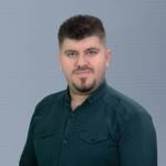The sound of nature and animals in this Syrian village is striking. You can see everything but humans.
Til Khatun is a village near the Turkish border about 30 kilometers east of the city of Qamishli. Nearly 100 families from the Yezidi ethno-religious minority group lived here. But now, there are less than 10 families.
Siltan Hessen is one of the few residents left. Ten of her children migrated to Germany. Now, the Yezidi woman lives with her husband alone in the northeast Syrian village. She has given up hope for her children returning.
“They migrated to Germany and didn’t return,” she told Rudaw.
There are 56 Yezidi villages in the Al-Jazira province where Til Khatun lies in northeast Syria. Kurds call the northeast part of the country Rojava. The villages are distributed among the areas of Tirba Spi, Hasakeh, Amuda and Sari Kani.
Many Yezidi villages are now largely abandoned. Ninety percent of the inhabitants of five villages in Tirba Spi have evacuated, for example.
Yezidi areas in Syria are under threat to be evacuated completely.
Reporting by Rangin Sharo
Translation by Sarkawt Mohammed
Til Khatun is a village near the Turkish border about 30 kilometers east of the city of Qamishli. Nearly 100 families from the Yezidi ethno-religious minority group lived here. But now, there are less than 10 families.
Siltan Hessen is one of the few residents left. Ten of her children migrated to Germany. Now, the Yezidi woman lives with her husband alone in the northeast Syrian village. She has given up hope for her children returning.
“They migrated to Germany and didn’t return,” she told Rudaw.
There are 56 Yezidi villages in the Al-Jazira province where Til Khatun lies in northeast Syria. Kurds call the northeast part of the country Rojava. The villages are distributed among the areas of Tirba Spi, Hasakeh, Amuda and Sari Kani.
Many Yezidi villages are now largely abandoned. Ninety percent of the inhabitants of five villages in Tirba Spi have evacuated, for example.
Yezidi areas in Syria are under threat to be evacuated completely.
Reporting by Rangin Sharo
Translation by Sarkawt Mohammed









Comments
Rudaw moderates all comments submitted on our website. We welcome comments which are relevant to the article and encourage further discussion about the issues that matter to you. We also welcome constructive criticism about Rudaw.
To be approved for publication, however, your comments must meet our community guidelines.
We will not tolerate the following: profanity, threats, personal attacks, vulgarity, abuse (such as sexism, racism, homophobia or xenophobia), or commercial or personal promotion.
Comments that do not meet our guidelines will be rejected. Comments are not edited – they are either approved or rejected.
Post a comment